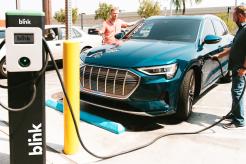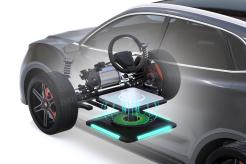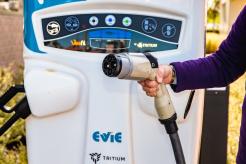Fleet electrification is transitioning a fleet of vehicles from traditional gasoline or diesel-powered vehicles to electric ones, including buses, taxis, freight trucks, personal cars, and more.
Electric vehicle fleets have many benefits over their gas-powered counterparts, including lower emissions, operating costs, and increased efficiency. However, fleet electrification also comes with several challenges that investors should consider before switching.
This blog post will explore fleet electrification’s top ten challenges and opportunities.
Challenges of Fleet Electrification

(Photo by Seb Creativo on Unsplash)
Upfront Costs
Electric vehicles are typically more expensive due to the higher cost of batteries and other components. Many government incentives and programs can help offset these costs. These include tax breaks, rebates, and access to low-cost financing. Electric vehicles have lower operating and maintenance costs than traditional vehicles and can save money over time.
The Need for a Specialized Workforce
Electric vehicles require different care. According to the American Financial Review, an extra 6,000 EV mechanics will be needed by 2030, meaning mechanics and other service providers must be trained to work on them. Fleet operators will have to adjust their hiring strategies. In addition, electric vehicles often require special infrastructure, such as charging stations, which must be installed and maintained by trained personnel.
Range Anxiety and Lack of Infrastructure
The third challenge is range anxiety and lack of infrastructure – the fear that an electric vehicle will run out of power before reaching its destination. This is a valid concern, as electric vehicles have shorter ranges. This issue is intimidating for fleet owners in the long-haul trucking space, as their vehicles must be able to travel long distances without stopping to recharge. However, several strategies can help mitigate this anxiety, such as using public charging stations and planning routes carefully.
Rapidly Changing Technology

(Photo by Mike B)
The EV industry is still relatively young, and technology is evolving quickly. Fleet operators must stay up-to-date on the latest advancements to make the best decisions for their business. Some truck and van models may become obsolete quickly, replaced with newer, more efficient models. Fleet operators should prepare their business models to adapt as EV technology changes.
Public Perception
Misinformation abounds about electric vehicles. Many people believe that they are slow, unreliable, and expensive. Partners, investors, customers, and employees may hesitate to work with or invest in a fleet transitioning to electric vehicles. However, this perception is, of course, incorrect. Electric vehicles are now faster, more reliable, and more affordable than ever.
Battery and EV Component Recycling
As electric vehicles become popular, battery recycling needs will increase. Recycling becomes challenging because batteries and other EV components contain harmful chemicals that must be disposed of properly. In addition, recycling batteries and other parts are complex and expensive. However, EV battery recycling capabilities are evolving rapidly.
Now that we’ve covered the challenges let’s move on to the opportunities.
Opportunities For Fleet Electrification

Affordability
Electric vehicles are becoming more affordable. As battery technology improves and production volumes increase, electric vehicle prices drop. Affordability applies to the broader consumer markets for personal EVs and the more niche markets for delivery vans and long-haul freight trucks. Competition drives down prices as new companies enter the market and established automakers release new models. In addition, government incentives can help offset the upfront cost of electric vehicles.
Growing Market Share

(Image Source: virta.global)
Another opportunity for fleet operators is the growing market share of electric vehicles. Electric vehicles are becoming more popular daily, and their market share will only grow. This growth is good news for fleet operators as more models are released, and prices continue to drop. The market for available fleet management software also continues to grow.
Reliability
In the early days of EV use, there were some concerns about the reliability of batteries and charging infrastructure. However, these issues have largely been resolved. Gas-powered trucks and vans have many components that can result in breakdowns, such as the engine, transmission, and fuel system, resulting in significant business consequences. Electric vehicles have far fewer moving parts and are much less likely to break down.
Improved Charging Times
Electric vehicles have shorter charging times than ever before. Drivers can charge newer models in as little as 30 minutes, and this time is only going to decrease as battery technology continues to improve. Fleet operators depend heavily on consistent, reliable schedules, and any delay can significantly impact their businesses. With improved charging times, electric trucks and vans can get back on the road faster than they did in the past.
Environmental Friendliness
Electric vehicles do not produce emissions, so they are much better for the environment than traditional vehicles. Zero-emission vehicles can help fleet owners attract and retain customers looking to work with companies that share their values. In addition, it can help fleet operators save money on fuel costs and qualify them for government incentives. And lastly, it can help improve the public perception of their business, as they contribute to our communal effort to protect our planet for generations to come.
Job Creation in the Electric Vehicle Industry
The electric vehicle industry is creating thousands of jobs. As the demand for electric vehicles grows, so does the need for workers to design, build, and maintain them. This is an opportunity for businesses and communities looking to attract and retain top talent. The electric vehicle industry is expected to create 150,000 jobs by 2030, so investors should take advantage of this opportunity.
Are you interested in learning more about the future of fleet electrification and EV charging infrastructure? Join us at the EV Charging Summit & Expo!






